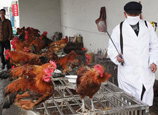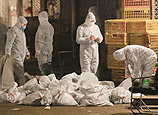
According to WHO, influenza A H7 viruses are a group of influenza viruses that normally circulate among birds. The influenza A(H7N9) virus is one subgroup among the larger group of H7 viruses. Although some H7 viruses (H7N2, H7N3 and H7N7) have occasionally been found to infect humans, no human infections with H7N9 viruses have been reported until recent reports from China.
What are the main symptoms of human infection with influenza A(H7N9) virus?
Thus far, most patients with this infection have had severe pneumonia. Symptoms include fever, cough and shortness of breath. However, information is still limited about the full spectrum of disease that infection with influenza A(H7N9) virus might cause.
How many human cases of influenza A(H7N9) virus have been reported in China to date?
New cases that are reported are now being compiled and posted daily. The most current information on cases can be found in PD Online.
How did people become infected with the influenza A(H7N9) virus?
Some of the confirmed cases had contact with animals or with an animal environment. The possibility of animal-to-human transmission is being investigated. Confirmed H7N9 cases in China were isolated and there has been no sign of human-to-human transmission.
How can infection with influenza A(H7N9) virus be prevented?
Although both the source of infection and the mode of transmission are uncertain, it is prudent to follow basic hygienic practices to prevent infection. They include hand and respiratory hygiene and food safety measures.
Hand hygiene:
• Wash your hands before, during, and after you prepare food; before you eat; after you use the toilet; after handling animals or animal waste; when your hands are dirty; and when providing care when someone in your home is sick. Hand hygiene will also prevent the transmission of infections to yourself (from touching contaminated surfaces) and in hospitals to patients, health care workers and others.
• Wash your hands with soap and running water when visibly dirty; if not visibly dirty, wash your hands with soap and water or use an alcohol-based hand cleanser.
Respiratory hygiene:
• Cover your mouth and nose with a medical mask, tissue, or a sleeve or flexed elbow when coughing or sneezing; throw the used tissue into a closed bin immediately after use; perform hand hygiene after contact with respiratory secretions.
Is it safe to eat meat, i.e. poultry and pork products?
Influenza viruses are not transmitted through consuming well-cooked food. Because influenza viruses are inactivated by normal temperatures used for cooking (so that food reaches 70°C in all parts— "piping" hot — no "pink" parts), it is safe to eat properly prepared and cooked meat, including from poultry and game birds.
Diseased animals and animals that have died of diseases should not be eaten.
In areas experiencing outbreaks, meat products can be safely consumed provided that these items are properly cooked and properly handled during food preparation. The consumption of raw meat and uncooked blood-based dishes is a high-risk practice and should be discouraged.
Is there a vaccine for the influenza A(H7N9) virus?
No vaccine for the prevention of influenza A(H7N9) infections is currently available. Read more>>>No vaccine currently available for human infection with H7N9
Does this influenza virus pose a pandemic threat?
The outbreak is still at an early stage and has not appeared in any concentrations, but the Chinese National Health and Family Planning commission said it is instructing regions to disclose new cases promptly, track people in close contact with infected people, and treat confirmed cases expediently, as national leaders have demanded. Read more>>>Risk of H7N9 epidemic low given current evidence
Is it safe to travel to China?
The number of cases identified in China is very low. WHO does not advise the application of any travel measures with respect to visitors to China nor to persons leaving China.
Are Chinese products safe?
There is no evidence to link the current cases with any Chinese products. WHO advises against any restrictions to trade at this time.
(Source: WHO)
















 Our luxuriously departed Paper-made "luxury" goods replace paper money as top offerings to the dead during Qingming
Our luxuriously departed Paper-made "luxury" goods replace paper money as top offerings to the dead during Qingming


![]()
